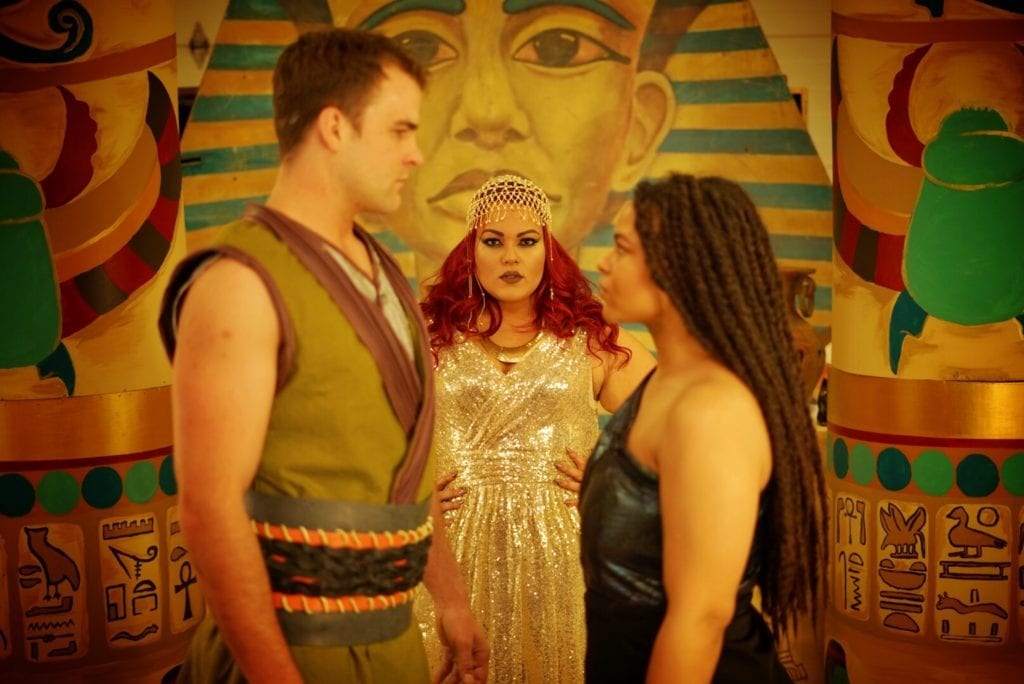OREM — Scera, a community gathering place for more than 85 years, hosts the award-winning musical Aida, directed by Matthew Herrick. This adaptation of the centuries-old opera featuring the music of Elton John and Tim Rice was spectacularly performed by local thespians in Utah County.

The Egyptian-themed set designed by M’liss Tolman was spectacular, with rocky stairs built to guide performers onto the stage, a variety of towering columns on wheels with detailed paintings and hieroglyphs native to the ancient, Northern African empire, and steps with similar markings and reliefs resembling others on stage. These steps were of particular interest, also built on wheels, and were moved across the stage in a range of different positions to add layers and height to the performers on set.
Beatriz Melo was the first to adorn the set, playing the Pharaoh’s daughter Amneris. In a shimmering gold gown and matching hedjet (created by costume designer Kelsey Seaver), she was the centerpiece for a modern-day Egyptian display at a high-class galleria. Stepping down from the pedestal that triumphantly buoyed her above bustling museum patrons, she began the production in typical Broadway style: with song.
From her first musical number that began the story of war and forbidden love to her final reprisal that brings the show to a spectacular close, Melo showcased her incredible range and lyrical abilities. Perhaps my favorite of her numbers was performed in Act I Scene 5, which revealed her character to be a fashionista and ancient Egyptian trendsetter. In addition to her vocals, her spunky attitude, emotional outbursts, and her more sincere and consequential moments, Melo showed that she has talent, promise, and great potential.
Betrothed to the royal princess Amneris is the young, strong Egyptian military captain Radames portrayed by Tyson Wright. Wright’s gradual revelation of his character’s kindness, generosity, and care for those around him was absolutely convincing; Wright as Radames carefully disclosed the layers of his personality as the plot unfolded, persuading the audience that Radames is an authentic individual. Radames’s authentic personality was evidenced specifically by his transforming approach to Aida as he realized his romantic feelings for her. He became more gentle, soft-spoken, and intent on assuring her of his love. His acting talent was coupled by his fantastic vocal performance, melting more hearts than one.

The show’s namesake is the main character, Aida, the former Nubian princess and now-slave to Egyptian nobility. At first I was unsure of Jalyn Macedone’s performance as this vital character, but I was soon convinced that she was a star. She seemed guarded and defensive to start, but as her own disposition was unfolded before my eyes, so was the talent of this phenomenal actress. This transition from a prickly bond-servant to an understanding, confident, enslaved princess who was unafraid to belt the high notes and share her opinions with superiors, revealed the true nature of Macedone’s theatrical and vocal aptitude.
Macedone, just as the majority of the cast, had fantastic musical abilities. Of note was Adam Taula, who immediately stood out in the group of Nubian slaves for his vocal strength; it was later learned that he would also play the Nubian king, Amonasro, though he caught my attention more powerfully in his earlier, more minor role. His talent was highlighted in the performance of, “The Gods Love Nubia,” in Act I Scene 10 because of the mighty, gospel-esque notes and lyrics he was able to flawlessly deliver.
I must also note Herrick’s insightful and impressive stage directions. The play began with full set pieces and outspread ensemble. The full, magnificent stage brought the audience into the ancient, musical world of Egypt; however, as the play continued, especially in Act II, the stage became completely empty, or nearly so, with only a few cast members whose powerful presence filled the theater. This reflected the script’s transition from an involved story of peoples at war to the deep, desolate feelings of star-crossed lovers.
Lighting, designed by Elizabeth Griffiths, enhanced these “dark” moments with powerful backdrop colors and singular spotlights on the individuals of focus. “Not Me,” performed in Act I Scene 9, is deserving of special highlight—the combined harmonies of Macedone, Wright, and Melo, with lights changed to accompany the emotional conflict, gave me goosebumps. The plot-shifting performance also included the vocal talents of the clever Nubian slave Mereb, played by Kiirt Banks. His role provided comical yet meaningful additions to the entire production.
The musical genius of Elton John and Tim Rice cannot be ignored, though there were moments that seemed slow, empty, and incohesive; the local cast and crew, of course, were not at fault. From 80’s rock-and-roll to upbeat reggae to tracks with obvious gospel choir influence, the music was fun, though sometimes unrelated to the rest of the musical production. These voids were simply musical rifts that did not move the story along, but they were filled by fun dances choreographed by Rick Robinson. There were moves inspired by Michael Jackson and group numbers that involved the entire stage. However, the ensemble dancers’ execution of these moves were not always in-sync with one another, and unfortunately, became distracting to the performance on occasion.
These minor criticisms should not detract from the spectacularism of the performance as a whole. From the diverting and realistic costume and set designs to the masterful stage directions and entertaining choreography, Aida at the Scera is an extravagant spectacle worthy of praise and admiration.
[box]Aida plays at the Scera Center for the Arts (745 State St, Orem) April 12-May 4, Mondays, Thursday, Fridays, and Saturdays at 7:30 PM. Tickets are $12-$14. For more information, visit their website.[/box]
